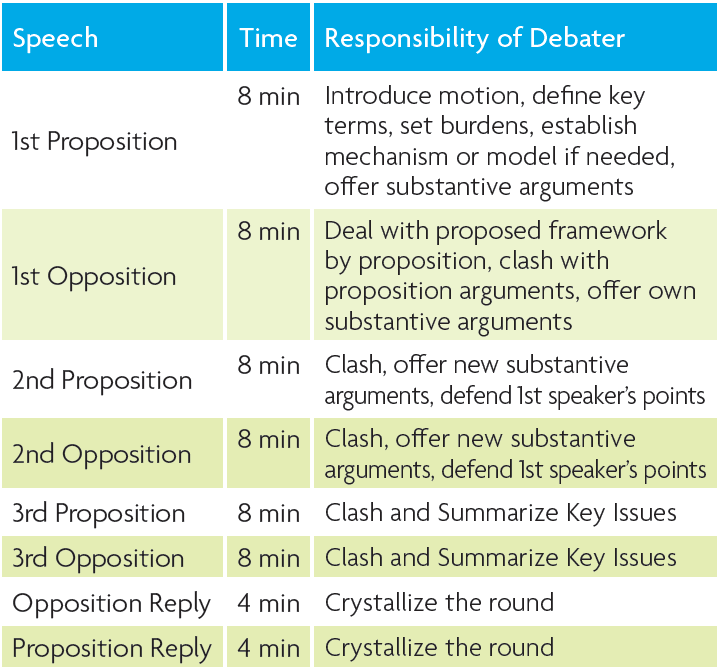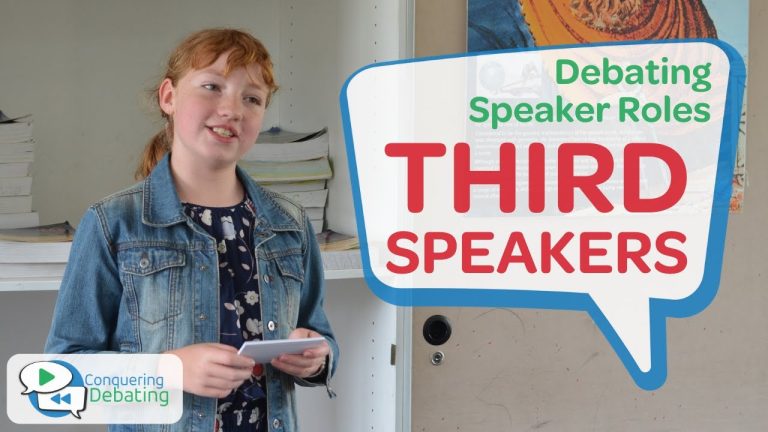How to Be Good at Debate
To be good at debate, express your message and its importance and break down your argument into smaller parts. Provide confirmation or proof, refute opposing arguments, and conclude effectively.
1. Understanding The Art Of Debate
Learn the art of debate and discover how to become good at it. Enhance your debating skills by following these guidelines and improve your ability to effectively communicate and make persuasive arguments.
Understanding The Art Of Debate
Debate is an essential skill that helps individuals express their opinions, communicate effectively, and critically analyze different perspectives. To be good at debate, it is crucial to understand the art of debate, which involves several key elements. In this section, we will discuss the importance of effective communication, developing critical thinking skills, and researching and gathering relevant information.
The Importance Of Effective Communication
Effective communication plays a vital role in debate, as it allows individuals to express their thoughts clearly and persuasively. Here are some key points to consider in regards to effective communication in debate:
- Clarity: It is important to articulate your arguments clearly and concisely, ensuring that your audience can understand your point of view.
- Confidence: Projecting confidence in your speech and body language can help make your points more convincing.
- Active Listening: Paying attention to what others are saying during a debate allows you to respond effectively and address counterarguments.
- Respectful Language: Using respectful language fosters a positive environment and encourages constructive dialogue.
Developing Critical Thinking Skills
Critical thinking skills are essential for effective debate. They enable individuals to analyze information critically, evaluate arguments, and form logical conclusions. Here are some key aspects of developing critical thinking skills in debate:
- Analyzing Arguments: Assess the validity and relevance of arguments presented by both sides of the debate.
- Identifying Fallacies: Recognize logical fallacies and avoid using them in your own arguments.
- Evaluating Evidence: Scrutinize the evidence used to support arguments and assess its credibility and reliability.
- Constructing Sound Arguments: Develop well-reasoned arguments supported by evidence and logical reasoning.
Researching And Gathering Relevant Information
Researching and gathering relevant information is crucial for a successful debate. Here are some key points to consider when conducting research:
- Identifying Reliable Sources: Look for reputable sources that provide accurate and trustworthy information.
- Diverse Perspectives: Explore various viewpoints on the topic to gain a comprehensive understanding.
- Fact-Checking: Verify facts and statistics to ensure the accuracy of your arguments.
- Organizing Information: Organize your research findings in a structured manner for easy reference during the debate.
Understanding the art of debate requires effective communication, critical thinking skills, and thorough research. By mastering these elements, you can improve your ability to engage in meaningful and persuasive debates. Now that we have explored the importance of effective communication, developing critical thinking skills, and researching and gathering relevant information, let’s delve into the next section: “2.
Mastering Persuasive Techniques. “
2. Mastering The Structure Of A Debate
In order to become proficient in debate, it is essential to master the structure of a debate. By following the 5 steps, including introduction, statement of fact, confirmation, refutation, and conclusion, individuals can effectively present their arguments and engage in productive discussions.
Mastering The Structure Of A Debate
Debating is not only about presenting your ideas but also about organizing your arguments effectively. Mastering the structure of a debate allows you to present your points coherently and persuasively. Here are some key aspects to focus on when it comes to the structure of a debate:
- ### Captivating the Audience
- Begin with a captivating opening statement or a thought-provoking question to grab the audience’s attention.
- Clearly state your position or proposition for the debate, making it easy for the audience to understand where you stand.
- Provide a brief overview of your main arguments to give the audience an idea of what to expect.
- ### Constructing Strong Arguments
- Gather reliable evidence and supporting examples to back up your main arguments.
- Structure your arguments logically, using a clear and concise format.
- Start each argument with a topic sentence that clearly states the main point you want to make.
- Provide sufficient explanation and analysis to support your claims.
- Use credible sources to strengthen your arguments and counter potential objections.
- ### Rebuttal and Counterarguments
- Anticipate potential counterarguments and objections from the opposing side.
- Develop strong rebuttals by addressing the weaknesses in the opposing arguments.
- Present counterarguments supported by evidence and logical reasoning.
- Refute the opposing side’s points effectively, highlighting the flaws in their logic or evidence.
- Use persuasive language and rhetorical strategies to make your rebuttals impactful.
Mastering the structure of a debate is essential for delivering a compelling and well-organized argument. By captivating the audience with your introduction, constructing strong arguments, and effectively countering opposing points, you can enhance your debating skills and increase your chances of success.
3. Winning Strategies For Debate Success
Discover the winning strategies for debate success with helpful tips on how to be good at debate. Improve your debating skills and arguments to become a strong and confident debater.
Building Persuasive And Convincing Arguments:
- Start by researching the topic thoroughly to gain a deep understanding.
- Clearly define your position and create a strong thesis statement.
- Gather evidence and supporting examples to back up your claims.
- Anticipate counterarguments and develop effective rebuttals.
- Structure your arguments logically, using clear and concise language.
- Use rhetorical devices like ethos, pathos, and logos to appeal to your audience.
- Incorporate real-life examples and relatable anecdotes to make your arguments more compelling.
- Present your arguments in a systematic and organized manner, focusing on the most important points.
- Highlight the key benefits or advantages of your position.
- Summarize your main points in a memorable and impactful way.
Using Logic And Reasoning To Support Your Points:
- Use deductive reasoning to draw logical conclusions from premises.
- Employ inductive reasoning to form generalizations or hypotheses based on observed evidence.
- Use syllogisms to establish the validity of your arguments.
- Point out fallacies in your opponent’s arguments and explain why they are invalid.
- Use analogies and comparisons to clarify complex concepts.
- Present statistical data and studies to support your claims.
- Use cause-and-effect reasoning to demonstrate the consequences of certain actions or the effectiveness of proposed solutions.
- Appeal to rationality and rational decision-making processes.
- Foster a sense of intellectual integrity by admitting limitations or weaknesses in your arguments.
Effective Delivery And Body Language:
- Speak clearly and confidently, using appropriate volume and pace.
- Maintain eye contact with your audience to establish trust and engagement.
- Use gestures and body language to emphasize key points and maintain interest.
- Vary your tone of voice to add emphasis and express conviction.
- Use strategic pauses to build suspense or allow the audience to absorb important information.
- Control nervous habits or mannerisms that may distract from your message.
- Be mindful of your posture and maintain an open and approachable stance.
- Project confidence and enthusiasm for your topic.
- Practice active listening skills and respond to audience questions or points of contention with respect and consideration.

Credit: www.prometheanworld.com
Frequently Asked Questions Of How To Be Good At Debate
What Are The 5 Steps In A Debate?
The five steps in a debate are: 1. Introduction: Express your message and why it’s important to your audience and yourself. 2. Statement of Fact: Break down the general thesis of your argument into smaller parts. 3. Confirmation, or proof: Provide evidence or examples to support your statements.
4. Refutation: Address counterarguments and provide rebuttals to strengthen your position. 5. Conclusion: Summarize your main points and restate your position, leaving a lasting impression on your audience.
How Are Some People So Good At Debate?
Some people are good at debate because they possess strong communication skills and the ability to think critically. They are adept at presenting logical arguments and supporting them with evidence. Good debaters are also skilled at active listening and rebutting their opponents’ arguments effectively.
They are confident and well-prepared, having researched and analyzed the topic beforehand. Additionally, they may have experience in public speaking, which helps them articulate their thoughts clearly and persuasively. Practice and experience also play a significant role in becoming good at debate, as it helps individuals refine their skills and become more comfortable in the debate format.
Ultimately, being good at debate requires a combination of communication abilities, critical thinking skills, preparation, practice, and confidence.
What Skills Do You Need To Win A Debate?
To win a debate, you need several key skills. First, you must have strong communication skills to effectively articulate your points. Second, critical thinking skills are crucial for analyzing information and forming logical arguments. Third, research skills are necessary to gather evidence and support your claims.
Fourth, you need the ability to think on your feet and respond quickly to counterarguments. Lastly, confidence and assertiveness are important to command attention and persuade the audience. With these skills, you can present your ideas convincingly and outshine your opponents in a debate.
How Can I Prepare For A Debate?
To prepare for a debate, follow these steps: 1. Begin with an introduction, expressing your message and its importance to your audience. 2. Break down the main thesis of your argument into smaller parts, stating facts to support each point. 3.
Provide confirmation or proof of your claims through research, examples, or expert opinions. 4. Anticipate counterarguments and prepare refutations to strengthen your position. 5. Conclude by summarizing your main points and restating the importance of your message. By following these steps, you can effectively prepare for a debate and present your arguments confidently.
Remember to research extensively, organize your thoughts, and practice articulating your points clearly to ensure a successful performance.
Conclusion
Debating skills are highly valued in today’s world, as they enable individuals to express their ideas effectively and engage in constructive discussions. By following a few key strategies, anyone can become good at debate. Firstly, understanding the importance of preparation is crucial.
Research your topic thoroughly and gather relevant evidence to support your arguments. Additionally, sharpening your critical thinking skills will help you analyze and respond to opposing viewpoints. Furthermore, practicing active listening and respectful communication is essential. Stay open-minded and consider different perspectives, while maintaining a calm and composed demeanor.
Moreover, honing your public speaking abilities will enhance your overall performance. Work on your delivery, tone, and body language to effectively convey your message. Lastly, remember that practice makes perfect. The more you engage in debates, the better you will become.
Seek feedback, evaluate your performance, and continuously strive for improvement. Becoming good at debate requires dedication, preparation, effective communication, and practice. By incorporating these strategies, you can confidently express your opinions, engage in meaningful discussions, and succeed in debates.





